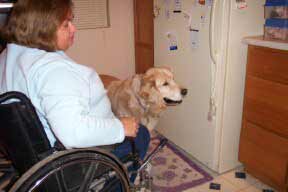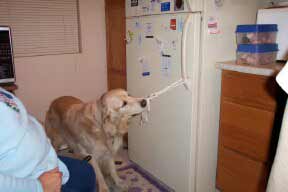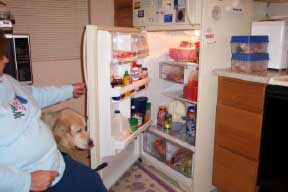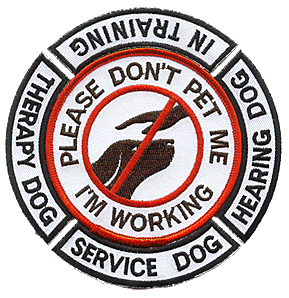Assistance Animal Information
Assistance dogs are highly trained professional dogs (Guide Dogs, Hearing Dogs, Service Dogs) who work in partnership with disabled persons to increase the independence, safety, and mobility of the human partner.
Read on to find out more information!
Assistance Animal Links
Buddy has been a big help to me. He pulls my manual wheelchair, helps me keep my balance when I walk, retrieves dropped items, and opens and closes doors. Buddy has learned how to help me answer the phone, turn lights on and off, transfer in and out of the shower and chair, and dress and undress. He helps me with laundry and house keeping, can pay at the cash register, and carry some shopping bags. Buddy also can help with safety issues. He is learning tasks to help with my hearing loss and can get help on command. Having an assistance dog helps me stay independent without the relying on another person. Maybe an assistance dog would work for you. I hope this page will answer any questions you have about finding and working with an assistance dog |
|
HEARING DOGS assist their deaf or hard of hearing partners by ALERTING them to sounds such as the alarm clock, stove timer, baby crying, phone ringing, doorbell, smoke alarm, car honking and sirens. SERVICE DOGS are trained to assist physically disabled people in a number of ways. They can be custom trained for the particular needs of an individual. For example a service dog can:
Here are some good links about assistance
dogs:
Clickertales
Here is the Grant contact information:
|
 For more information and related articles on Assistance Animals, visit our LIBRARY
For more information and related articles on Assistance Animals, visit our LIBRARY

 My
name is Liz Carabine, I am a woman who experiences hemiplegia after
being paralyzed on my left side in 1994. In 1999 I was partnered
with my service dog, Buddy. Buddy is a golden retriever from the
Assistance Dog Institute in CA.
My
name is Liz Carabine, I am a woman who experiences hemiplegia after
being paralyzed on my left side in 1994. In 1999 I was partnered
with my service dog, Buddy. Buddy is a golden retriever from the
Assistance Dog Institute in CA. GUIDE
DOGS assist their blind or visually impaired partners
to independently and safely negotiate the environment by GUIDING
them around obstacles and safely across streets and STOPPING at
curbs and steps.
GUIDE
DOGS assist their blind or visually impaired partners
to independently and safely negotiate the environment by GUIDING
them around obstacles and safely across streets and STOPPING at
curbs and steps.  They
can also alert their owner to various things including impending
seizures, low blood sugar, chemical sensitivities and cardiac
conditions.
They
can also alert their owner to various things including impending
seizures, low blood sugar, chemical sensitivities and cardiac
conditions. 
